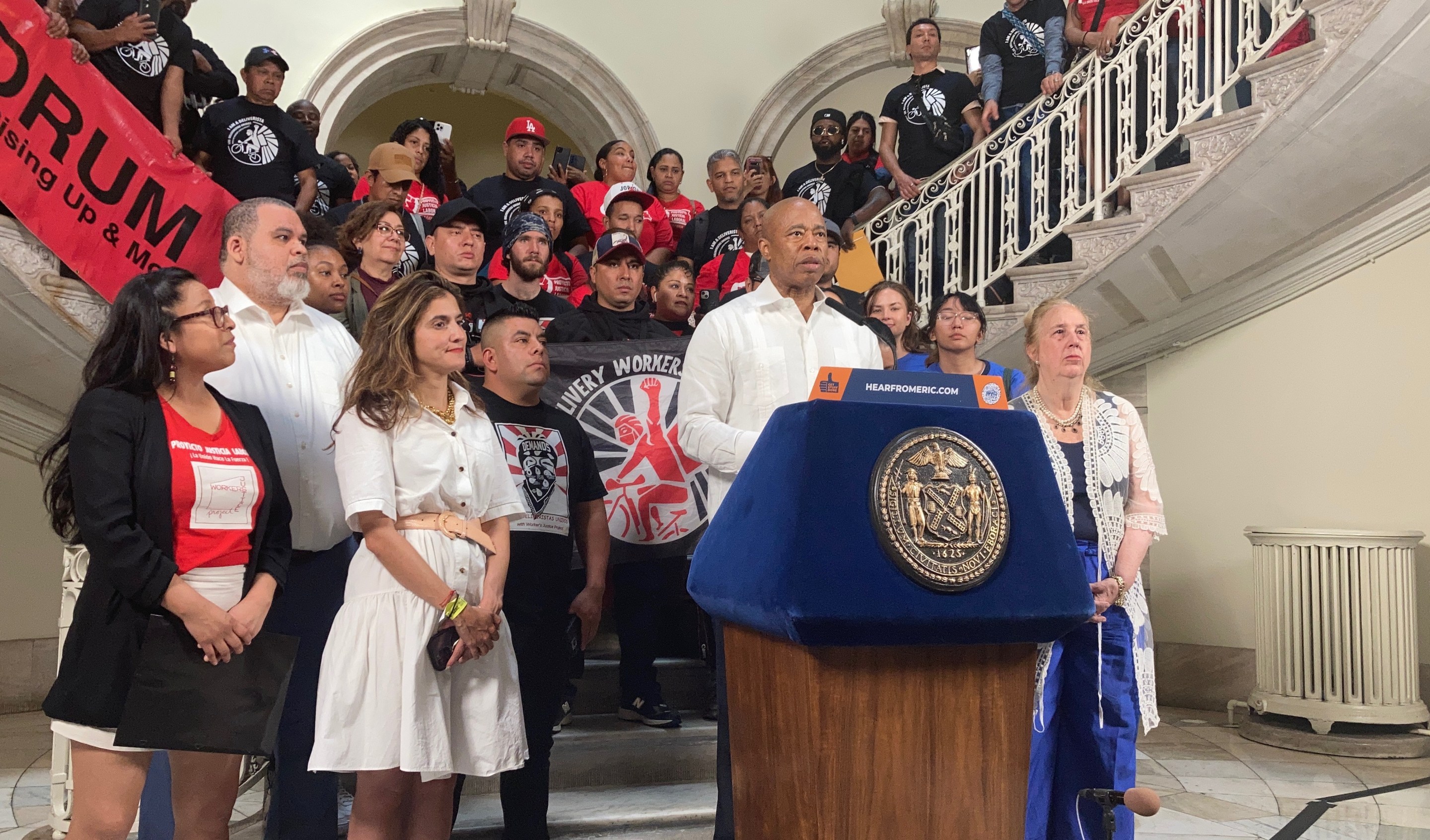Not so fast — unless you’re a delivery worker.
The city’s first-in-the-nation minimum wage for delivery workers faced a new challenge in court on Thursday, just days before it was set to launch next week, with app delivery companies Uber, DoorDash, GrubHub, and Relay claiming in separate suits that the Department of Consumer and Worker Protection set the pay rates based on "fundamentally flawed and biased" data.
“The Department developed and assessed its new rules based on flawed data resulting from biased surveys and unrealistic assumptions that amount to little more than wishful thinking,” Uber attorney Karen Dunn wrote in the 102-page lawsuit.
Relay, which did not respond to a request for comment, filed its own lawsuit against the city, while DoorDash and GrubHub filed a joint lawsuit on the same day. The companies aim to strike down the minimum $17.96 per hour rate set to launch July 12, which will increase to $19.96 per hour on April 1, 2025.
The fate of the minimum wage rule — which the City Council required back in 2021 — now rests with Judge Nicholas Moyne of the New York State Supreme Court. Delivery workers today make just $7.09 per hour on average, excluding tips.
The rule was supposed to take effect at the start of this year, but lobbying efforts from the tech industry delayed its implementation and pressured Mayor Adams to lower the wage from an initial rate of $23.82 an hour proposed back in March.
If the apps get their way, deliveristas, who brave dangerous roads, hostile weather conditions and, most recently, harsh smoke from wildfires will be stuck with sub-standard wages, city officials said.
“Delivery workers, like all workers, deserve fair pay for their labor, and we are disappointed that Uber, DoorDash, GrubHub, and Relay disagree. These workers brave thunderstorms, extreme heat events, and risk their lives to deliver for New Yorkers — and we remain committed to delivering for them,” said DCWP Commissioner Vilda Vera Mayuga.
"The minimum pay rate will help uplift thousands of working New Yorkers and their families out of poverty.”
But according to DoorDash, which threatened legal action against the city last month, the company is not opposed to a minimum pay rate — it just disagrees with the process by which this particular one was set.
“Bad policies cannot go unchallenged, and we will not stand by and let the harmful impacts of this earnings standard on New York City customers, merchants, and the delivery workers it was intended to support go unchecked,” said a DoorDash spokesperson.
“We — and others — clearly and repeatedly warned the city that using such a flawed process to underpin its rule-making would have lasting and harmful impacts for all New Yorkers who use these platforms, but the approach that DCWP took was sadly not one that reflected this, and has left us no choice but to take our concerns to court.”
Both Comptroller Brad Lander and the Worker’s Justice Project, which organized Los Deliveristas Unidos in 2020, blasted the trio of lawsuits for trying to strike down workers' much-deserved pay increase.
"After a seven-month delay in implementation of a minimum pay rate, it's unconscionable that multi-billion dollar companies would now turn around and continue to do everything in their power to prevent New York City's more than 65,000 app-based delivery workers from earning a livable wage," said Ligia Guallpa, the executive director of the Worker’s Justice Project. "This latest legal maneuver to prop up their business model comes at the expense of workers who can barely survive in a city facing a massive affordability crisis."
No surprise that @Grubhub, @DoorDash, & @Uber are out to squeeze every last penny they can from delivery workers.
— Comptroller Brad Lander (@NYCComptroller) July 6, 2023
NYC’s for-hire driver minimum pay law benefits drivers without harming ridership.
The delivery-worker minimum pay law will work just as well.https://t.co/Fju1SGSX88
Lander called out "gig companies" for repeatedly fighting city laws aimed to protect the quality of life of their workers.
“Gig companies have sued New York City repeatedly: to block accessibility requirements for people-with-disabilities, to reduce cruising time, and to prevent the minimum pay requirement for for-hire drivers that became law in 2019," the comptroller said.
"New York City’s for-hire driver minimum pay law benefits drivers without harming ridership, and the delivery-worker minimum pay law will work just as well.”
Update: On Friday afternoon, Judge Moyne issued a temporary restraining order on the city's minimum pay rate, putting it on pause until a July 31 hearing, at which time Moyne could issue an injunction, effectively stopping the rule as he considers the merits of the case .
"We are extremely disappointed that the apps are delaying the implementation of the minimum pay rate. These apps currently pay workers far below the minimum wage, and this pay rate would help lift thousands of working New Yorkers and their families out of poverty. We look forward to a quick decision so that the dignified pay rate that workers deserve to earn is not delayed any more than necessary," said DCWP Commissioner Mayuga.






